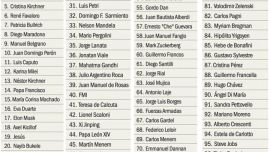The International Monetary Fund said Friday that its latest round of talks with Argentina over a new debt relief programme had included discussion of an “appropriate” monetary policy with interest rates that are higher than inflation.
After a week of meetings in Washington with a team of Argentine officials, the statement was the IMF’s most detailed outline yet for the type of inflation strategy Argentina needs to implement as part of a programme to reschedule payments on more than US$40 billion in debt.
The multilateral lender said that "progress" had been made in talks and that a "general understanding" had been reached on several issues, though it called for a “reduction of monetary financing of the fiscal deficit.”
The IMF also noted Argentina’s "stronger-than-expected rebound," but warned officials to recognise "the need to gradually and sustainably improve public finances," including with "policies to build international reserves."
Talks also covered recent economic developments and balance of payments issues.
“Tackling persistent high inflation requires a multi-pronged approach involving a reduction of monetary financing of the fiscal deficit, appropriate monetary policy with positive real interest rates, and wage-price coordination,” read the IMF statement, issued by the Western Hemisphere Deputy Director Julie Kozack and Mission Chief to Argentina Luis Cubeddu.
Any move to tackle inflation “must also be supported by policies to accumulate international reserves, including through the promotion of foreign direct investment and exports, which grew very strongly this year, especially in value-added sectors,” added the officials.
Argentina’s benchmark interest rate is currently 38 percent, while the rate of inflation is 52 percent.
Momentum
Negotiations between Argentina and the IMF have picked up momentum in recent weeks after nearly two years without concrete progress.
Fund officials on Friday noted the “general understandings” between both sides over the past week, including on improving public finances while also allowing for “targeted social spending.”
Yet more discussions will be needed with officials from President Fernández's government as both sides work toward a new programme, the statement concluded.
Sources within Argentina’s government reacted positively to the statement, saying it had recognised that the “recovery of production and investment” in the country had been “stronger than expected.”
“This recognition is important for the definition of the starting point of an eventual new programme,” an unnamed source told the Noticias Argentinas news agency, noting that the IMF’s call to prioritise “investments in infrastructure, technology and social inclusion” strengthened the government’s case that austerity would put the recovery at risk.
"This message is in line with the vision that has been the basis of the budgetary programming promoted by the government," said the source.
President Alberto Fernández announced after midterm elections on November 14 that his government would send a multi-year economic plan to Congress that would serve as the basis for an IMF deal.
Fund officials said that both parties agreed that “broad support, both domestically in Argentina and from the international community, would also be critical to the overall success of the economic programme."
Presidential Spokesperson Gabriela Cerruti said Thursday the plan will go to Congress before the end of the year, though the statement’s call for “further discussions” pours cold water over hopes that a deal could be reached before the end of the year.
New deal
Argentina is seeking to replace the three-year stand-by agreement for US$57 billion granted in 2018 to the government of former president Mauricio Macri (2015-19), of which around US$44 billion was disbursed. After taking office in December 2019, President Fernández refused to accept the remaining tranches of the loan.
Officials are seeking an Extended Fund Facility programme that would allow deadlines to be postponed and lengthened.
The nation's current agreement, agreed by Macri’s Cambiemos government, obliges the repayment of maturities in 2022 and 2023 worth more than US$19 billion each year, with another US$5 billion due in 2024.
So far this year, Argentina has made a US$1.9 billion payment, and paid US$1.3 billion in interest. The government has said it will make a further US$1.8 billion payment by December 18 as talks continue.
Argentina, the IMF's biggest debtor, has been in recession since 2018 and is seeking to renegotiate its debt following a 9.9 percent collapse in GDP last year.
The country’s mission team to Washington was composed of Economic Policy Secretary Fernando Morra, Finance Secretary Raúl Rigo, Undersecretary of Financing Ramiro Tosi and Central Bank officials Jorge Carrera and Germán Feldman.
Argentina's representative to the IMF, Sergio Chodos, was also present.
– TIMES/BLOOMBERG/NA/AFP

























Comments